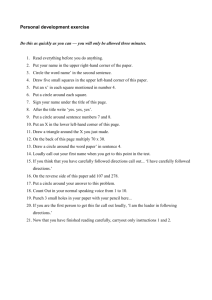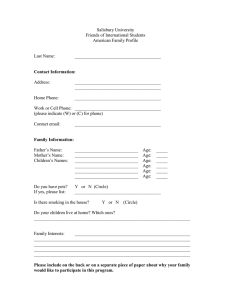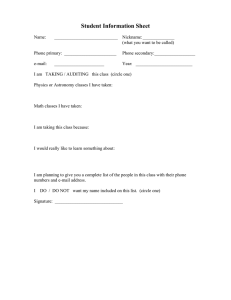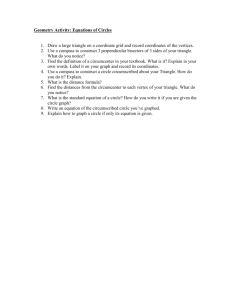following Directions
advertisement
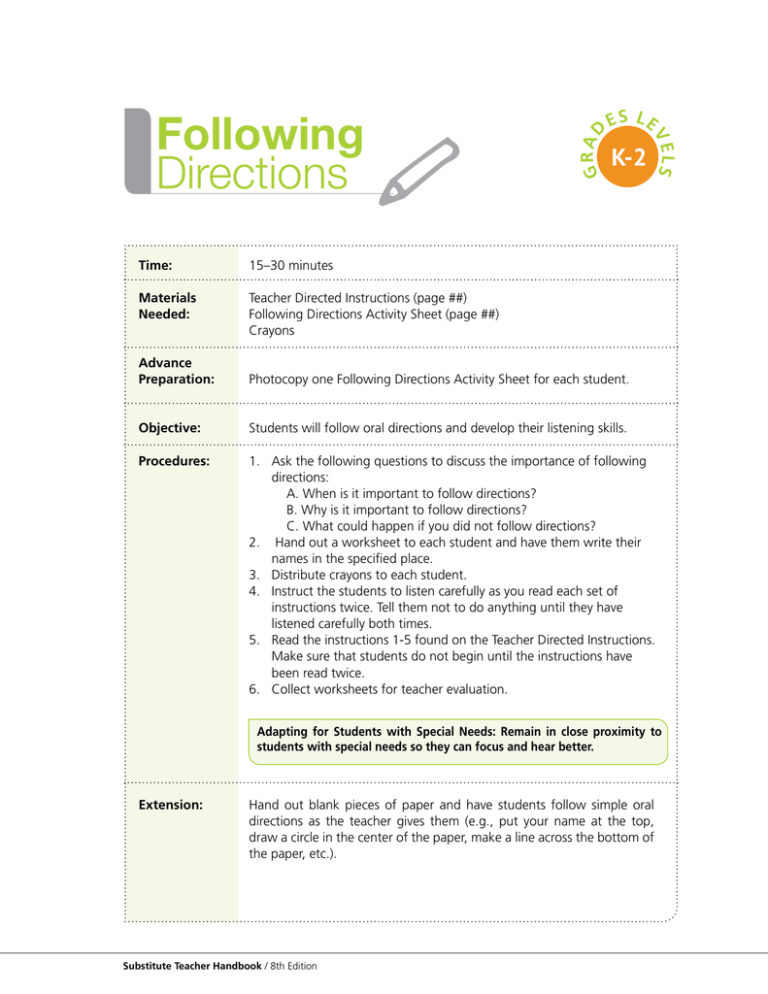
Time: grad K-2 VELS Following Directions es LE 15–30 minutes Materials Teacher Directed Instructions (page ##) Needed: Following Directions Activity Sheet (page ##) Crayons Advance Preparation: Photocopy one Following Directions Activity Sheet for each student. Objective: Students will follow oral directions and develop their listening skills. Procedures: 1. Ask the following questions to discuss the importance of following directions: A. When is it important to follow directions? B. Why is it important to follow directions? C. What could happen if you did not follow directions? 2. Hand out a worksheet to each student and have them write their names in the specified place. 3. Distribute crayons to each student. 4. Instruct the students to listen carefully as you read each set of instructions twice. Tell them not to do anything until they have listened carefully both times. 5. Read the instructions 1-5 found on the Teacher Directed Instructions. Make sure that students do not begin until the instructions have been read twice. 6. Collect worksheets for teacher evaluation. Adapting for Students with Special Needs: Remain in close proximity to students with special needs so they can focus and hear better. Extension: Hand out blank pieces of paper and have students follow simple oral directions as the teacher gives them (e.g., put your name at the top, draw a circle in the center of the paper, make a line across the bottom of the paper, etc.). Substitute Teacher Handbook / 8th Edition Critical Thinking Activities Teacher Directed Instructions Following Directions: Distribute to each student a copy of the Following Directions Activity Sheet and crayons. Tell them to listen carefully while you read the instructions out loud. Say: “Listen carefully to what I say to do. I will repeat each direction only two times. Do exactly what I say.” 1. Find the square with the butterfly in the corner. Put your finger on the butterfly. Color in the triangle with your crayon. Put an X in the circle. Draw a circle inside of the square. 2. Find the square with the umbrella in the corner. Put your finger on the smallest square. Color the umbrella. Write the letter A in the biggest square. Draw a line through the middle square. 3. Find the square with the apple in it. Put your finger on the apple. Now look carefully at the triangle. Draw a line above the triangle. Draw a square inside the triangle. Outline the triangle with your crayon. 4. Find the square with the flower in the corner. Put your finger on the flower. Look carefully at the circles. Draw a triangle inside the top circle. Write the letter your name begins with in the biggest circle. Color the smallest circle. 5. Turn your paper over. Draw a big circle. Make this circle into a happy face. ©STEDI.org web Following Directions Activity Sheet Name: Substitute Teacher Handbook / 8th Edition grad 2-6 VELS Guess the Object es LE Time: 30+ minutes Materials Needed: Pencil Paper Objective: Students will practice their listening and oral direction skills. Procedures: 1. Have the class draw an object as you give an oral description. The object should be simple like a toothbrush, pencil, football, key, flowers, umbrella, etc. 2. Do not identify the object by name until students have had a chance to guess what it is and share their pictures with class members. 3. Repeat the activity with students giving oral directions for the class to draw and guess at. 4. Discuss the importance of listening carefully and giving good directions during this activity. 5. Discuss other situations when it is important to listen carefully or communicate clearly. Extension: 1. Divide the class into teams of two and get them to practice giving descriptions and listening to one another to guess what is being described. 2. Have students draw a simple picture using geometric shapes (see examples on page ##). If time allows, have them color their pictures. 3. Organize the students into partners and instruct them to sit back- to-back. 4. Have one student give directions about how to draw his picture while the other follows the directions and completes a drawing on the back of his paper. NOTE: The student giving directions cannot look at the drawing in progress and the student drawing cannot ask questions. 5. Have students change roles. 6. When they are finished, have students compare pictures and discuss which directions were easy to follow and which were confusing. 7. Get the students to complete the activity again with a different partner. Compare the second partner’s drawing with the one done by the first partner to determine which time they gave better directions. ©STEDI.org grad 4-8 VELS The Plimpton Hold Up es LE If you were present for three minutes at the scene of the hold up pictured below and later were questioned as a witness, how many questions relating to it could you answer? Study this picture carefully for three minutes and without referring to the picture again, answer as many of the questions as you can. Substitute Teacher Handbook / 8th Edition Adapting for Students with Special Needs: Allow more time for students with special needs to view the picture. The Plimpton Hold Up Questions 1. 2. 3. 4. 5. 6. 7. 8. 9. 10. 11. 12. 13. 14. 15. 16. 17. 18. 19. 20. 21. 22. 23. 24. 25. 26. 27. 28. 29. 30. In what town did the hold-up occur? What was held up? What is its correct address? On the corner of what two streets is it? Is the thief in the picture? Where is he? How much money did he steal? Did the policeman see the hold-up? What is he doing about it? What is the name of the taxi company? What is the number of the taxi? In what direction is the taxi going? What time did the hold-up take place? What is the date? How many people are shown? How many are aware of the hold-up? What kind of store is next to the bank? Who owns it? What is its correct address? What kind of store is on the corner? Who owns it? What is the number of this store? At the corner of what two streets is it? Which of these two is the one-way street? In what direction does traffic go on this street? Where is the hydrant? What does the sign on 20th Street advertise? What is the price of the advertised product? Is there a postbox shown? On what street are the car tracks? ©STEDI.org grad 4-12 Materials Needed: Desert Dilemma worksheet (page ##) for each student or group Advance Preparation: Make photocopies of the student worksheets. Objective: Procedures: Extension: Students will practice critical thinking skills as they analyze and discuss different priorities in a difficult situation. 1. Distribute to the class the Desert Dilemma worksheets, either indi vidually or in small groups. 2. Review the situation and instructions as a class. 3. Allow students 10 minutes to rank the items listed. 4. Have a class discussion on how they ranked the items allowing students to justify or revise their own choices. Get the students to list the objects on the back of their paper and put a star next to each of the objects they plan to carry. Then explain in writing how they plan to use each of these items. TIPS for Success: This activity can be done as a class with one student giving directions, and the other students doing the drawing at their own desks. Substitute Teacher Handbook / 8th Edition VELS Desert Dilemma es LE Word Puzzles se ar ch gesg segg sgeg NOT GUILTY STANDER BELT HITTING ar up ms GIVE GIVE GIVE GIVE cover agent an d KISS egsg NEFRIENDED wear long man board A L EZ iiii D S GET GET GET GET LM AL EA AE EM ML he art A CHAIR TIRE ©STEDI.org 1 1,000, 000 go i g n a ro d u n standing miss OS C TS time time stand I WALKING SOUP re a din g b sick ed g r u the block everyrightthing n i n n Substitute Teacher Handbook / 8th Edition LO knee lights R O O A D D S ter very esting VE head heels R ground feet feet feet feet feet feet i 8 S Answers to Word Puzzles Word Puzzles One: Word Puzzles Two: 1. Kiss and make up 2. Search high and low 3. Friend in need 4. Long underwear 5. Scrambled eggs 6. Up in smoke 7. Forgive and forget 8. Undercover agent 9. Innocent bystander 10. Man overboard 11. Easy on the eyes 12. Three square meals 13. Hitting below the belt 14. Tossed salad 15. Broken heart 16. Black and white TV 17. Up in arms 18. High chair 19. Flat tire 20. Downtown 1. Sock in the eye 2. One in a million 3. Rising costs 4. Six feet underground 5. Going around in circles 6. Time after time 7. I understand 8. Touchdown 9. Misunderstanding between friends 10. Walking tall 11. Split pea soup 12. Very interesting 13. Reading between the lines 14. Sick in bed 15. Head over hills in love 16. Neon lights 17. Running around the block 18. Right in the middle of everything 19. Crossroads 20. I over ate ©STEDI.org
